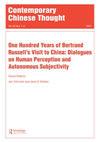清末民初的民主观念及其渊源
IF 0.4
3区 哲学
0 ASIAN STUDIES
引用次数: 1
摘要
在这篇文章中,黄提供了从清末到民国初期知识分子对民主、代议制会议和政党的概念化方式的历史叙述。他概述了这一时期中国民主思想的13个特征,然后追溯了每一个的历史起源。本文章由计算机程序翻译,如有差异,请以英文原文为准。
The Late Qing and Early Republican Conception of Democracy and its Origins
EDITOR’S ABSTRACT In this article, Huang provides a historical account of the way intellectuals have conceptualized democracy, representative assemblies, and political parties from the end of the Qing dynasty to the beginning of the Republican period. He outlines thirteen items that characterize Chinese democratic thought during this period, before tracing the historical origins of each.
求助全文
通过发布文献求助,成功后即可免费获取论文全文。
去求助
来源期刊

CONTEMPORARY CHINESE THOUGHT
Multiple-
CiteScore
0.10
自引率
0.00%
发文量
0
期刊介绍:
This wide ranging journal is essential reading for anyone who wants to understand the diverse themes and influences that shape Chinese thought today. It features translations of the most current and influential Chinese writings on all aspects of philosophical endeavor, from theoretical essays on systems to studies of China"s cultural and religious development, from interpretations of the Chinese classics to exegeses on Marxist thought.
 求助内容:
求助内容: 应助结果提醒方式:
应助结果提醒方式:


